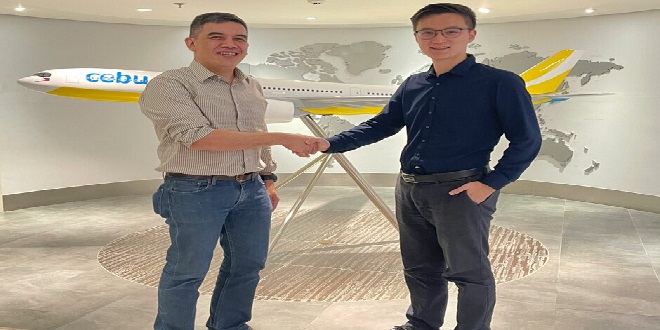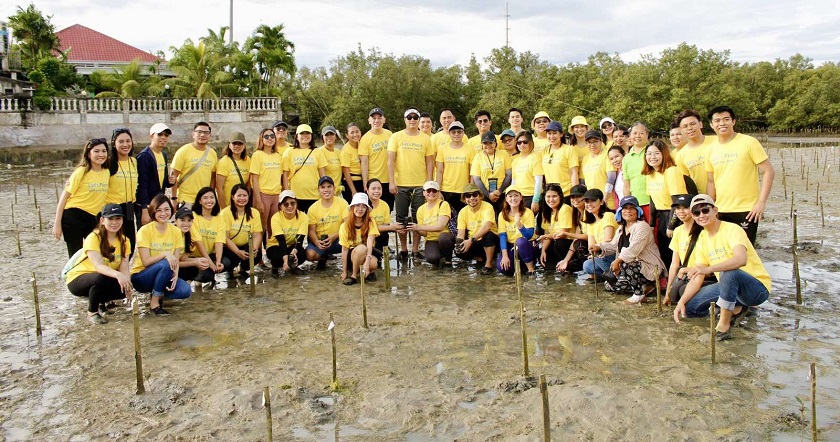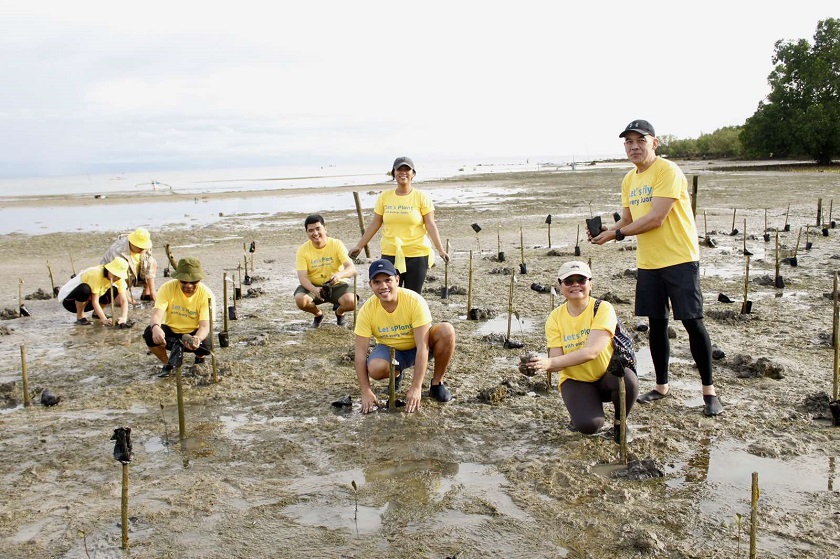
Cebu Pacific, the leading airline in the Philippines, has teamed up with the Ramon Aboitiz Foundation Inc. (RAFI) One to Tree program to support the conservation and restoration of mangroves in Cebu.

In a joint effort, CEB and RAFI signed a memorandum of agreement to enhance a mangrove plantation in Barangay Tapon, Dumanjug, Cebu. The ambitious project aims to plant 10,000 mangrove seedlings across approximately 10 hectares of mangrove area.
Recently, volunteers from both organizations jumpstarted the initiative by planting seedlings in Bgy. Tapon, Dumanjug Cebu.
Alex Reyes, Cebu Pacific’s Chief Sustainability Officer, emphasized the significance of nature-based solutions, stating, “We believe that nature-based solutions such as this mangrove plantation project have a critical role to play in removing carbon from the atmosphere. This initiative allows us to achieve three objectives – mitigating the impacts of carbon emissions on the environment, improving disaster resilience of coastal communities, and providing livelihood support to the Dumanjug community.”
To ensure the success of the project, CEB and RAFI will collaborate closely with the Tapon Fisherfolks Association and offer extensive training in various aspects of mangrove plantation, including design, nursery management, seedling production, site preparation, establishment, maintenance, and monitoring.
Participating members of the fisherfolk association will also receive income augmentation through their involvement in the project, including labor provision for planting site preparation, establishment, maintenance, and seedling purchases.
Antony Dignadice, RAFI OTT Program Director, expressed excitement about the partnership, saying, “We are excited to launch this mangrove rehabilitation partnership with Cebu Pacific. Through our shared values towards biodiversity conservation, we will be able to enhance the mangrove forest in the municipality of Dumanjug and build a more sustainable and disaster-resilient community. It truly takes everyone’s help now to build a sustainable tomorrow.”
The partnership is set to run for three years, focusing on the identification, establishment, planting, maintenance, and monitoring of the mangrove plantation in the Municipality of Dumanjug. More than 20 community partners from the fisherfolk association will be actively involved in the project.
Felix Lopez, Cebu Pacific’s Chief Human Resources Officer, expressed pride in the company’s employees’ spirit of volunteerism and shared other environmental initiatives taken by the airline. These initiatives include transitioning to zero-emission electric vehicles for employee shuttle services and evaluating the installation of onsite solar power to supply renewable energy for key buildings.
The restoration of mangroves is crucial for the Philippines, given the alarming decline they have experienced. According to a study by scientists from the University of the Philippines, the country suffered the second-worst loss of mangroves in Southeast Asia between 1990 and 2010, with a 10.5 percent decline.
Mangrove forests provide livelihoods and crucial protection for many coastal communities against typhoons. These dense coastal forests are home to diverse ecosystems that support marine life and act as vital breeding grounds for fish.
As the Philippine leader in propelling decarbonization in the aviation industry, Cebu Pacific has also implemented other initiatives to minimize its environmental impact. These include plans to operate an all-NEO (New Engine Option) fleet that consumes less fuel and emits reduced carbon by 2028, as well as incorporating blended sustainable aviation fuel (SAF) into its operations.

Embracing Climate Ambition: Cebu Pacific Embarks on a Sustainable Journey
Cebu Pacific, the Philippines’ leading airline, is forging a partnership with South Pole, a renowned climate company specializing in climate change solutions, to establish a robust climate strategy. This collaboration further strengthens CEB’s dedication to environmental stewardship and aligns with the global aviation industry’s goal of achieving net-zero carbon emissions by 2050.
In 2022, the International Civil Aviation Organization set an aspirational target of net-zero carbon emissions by 2050 in support of the United Nations Framework Convention on Climate Change. A year earlier, the International Air Transport Association (IATA) committed to “Fly Net Zero” by achieving net zero carbon emissions by 2050.
Mike Szucs, Cebu Pacific’s Chief Executive Officer, expressed the airline’s support for the global aviation community’s net-zero commitment. Under South Pole’s expert guidance, CEB will develop a comprehensive plan of action to address emission hotspots in its operations. This roadmap will incorporate existing initiatives and future plans, all contributing to CEB’s aspiration of meeting aviation’s net-zero goal.

The partnership with South Pole entails a thorough assessment of the greenhouse gas (GHG) emissions produced by Cebu Pacific’s operations, leading to the establishment of near-term and long-term emission reduction pathways. This process will complement CEB’s ongoing decarbonization strategy, which includes fleet modernization, fuel efficiency measures, integration of sustainable aviation fuel (SAF), adoption of electric vehicles, and reliance on renewable energy sources.
Alex Reyes, CEB’s Chief Strategy Officer overseeing sustainability, acknowledged that while the airline has been tracking and reporting Scope 1 and 2 GHG emissions since 2018, Scope 3 emissions remain a challenge due to their complexity. South Pole’s climate expertise will be instrumental in validating and addressing these material emissions, ensuring a credible and effective emissions reduction pathway.
South Pole will collaborate with CEB to assess and identify Scope 3 emissions across the entire value chain, encompassing upstream and downstream activities. By placing climate at the core of its strategy, CEB aims to drive a sustainable long-term recovery in the aviation industry and contribute to achieving the global net-zero target by 2050.
Shruti Singh, South Pole’s Director of Climate Strategies for Asia Pacific, expressed confidence in CEB’s potential to lead positive change in the aviation industry. With a well-defined climate strategy roadmap, CEB will align its emissions reduction pathway with climate science and the global temperature targets outlined in the Paris Agreement.
The aviation industry is responsible for approximately 2-3% of global emissions, making its transition to net-zero crucial for addressing climate change. Cebu Pacific is fully committed to playing its part in this global transition and working towards a sustainable future.







